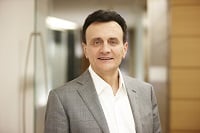Today's Telegraph gives AstraZeneca ($AZN) a rousing hurrah today in a lengthy piece, noting that its plans to build a new $500 million facility in Cambridge, U.K., has the potential to fast-track the area's emergence as a major global biotech hub. The feature has everything from M.P.s to biotech boosters doing what they do best: enthusing over the transformation of the Big Pharma company into an economic development engine that will spark a tech renaissance and pushing for a big public investment in infrastructure to make it all happen.
 |
| AZ CEO Pascal Soriot |
Just pour in £1 billion pounds, add a global corporation looking to do cutting-edge work, call up a gang of entrepreneurs, mix and bake and in no time at all you have a new tiger biotech economy on your hands.
"That's the great thing about tech, you can suddenly get it, make it commercial and you've got £200 million," says George Freeman, an M.P. and an adviser to the coalition government. "You don't have to spend four generations of a German family building Mittelstand."
As AstraZeneca CEO Pascal Soriot had observed earlier, "we've lost some of our scientific confidence." And with some big translational efforts, including a major investment in new, untested RNA technology, he believes they can get that spark back in Cambridge, where the HQ and research staff will be headed once the new facility is complete.
What The Telegraph fails to find--oddly, given the fresh patent setback AstraZeneca suffered today--are any cautionary voices. Despite Freeman's cocksure enthusiasm, AstraZeneca offers a prime example of just how risky drug development can be. And AstraZeneca has, at least initially, decided to focus on translational research--which under the best of circumstances requires a long, grueling slog in the lab.
Curiously, Soriot has opted to concentrate much of its deal money on preclinical work at a time its late-stage pipeline has been subjected to some of the harshest criticism the industry has ever heard.
Leerink Swann's Seamus Fernandez offered encouragement when he noted that AstraZeneca's new R&D team seems quite confident about the new direction. This is what he wrote about Phase III:
"R&D leadership enthusiastic about Ph III programs for lesinurad (gout), PARP near-term (ovarian cancer), and perhaps in contrast to CEO Soriot, selumetinib (MEK inhibitor for lung cancer). When asked about fostamatinib (oral SYK inhibitor for RA), mgmt conviction was less clear to us. Regarding the PARP inhibitor, AZN sees a path forward for olaparib in BRCA1/2 mutated ovarian cancer with an EU filing planned this year based on subset analyses that EU regulators are willing to accept."
But why cheer? Most of these drugs have failed decisively in clinical studies.
Fostamatinib fell behind Humira in a Phase IIb study that reported out last December. Olaparib, meanwhile, failed a mid-stage study for ovarian cancer more than a year ago, though European regulators now appear willing to review subset analysis, which is far from ideal. Two months before the olaparib failure AstraZeneca's selumetinib also failed a mid-stage study, falling short on the survival benefit. AstraZeneca's one standout--lesinurad--was a promising late-stage therapy for gout when AstraZeneca bought it with its $1.26 billion acquisition of Ardea.
AstraZeneca's plans for a rebirth, centering on its third restructuring which will run into 2016, suggested "a long, slow crawl out from beneath a host of past problems," Bernstein Research analyst Tim Anderson wrote at the time. It's worth adding that the company started this process under Soriot with one of the weakest Phase III plans among all Big Pharma companies. That hasn't changed, yet. And it's the only short-term strategy they have had at their disposal. If the U.K. is looking for a savior from economic malaise anytime soon, AstraZeneca is a long way from earning the title.
- here's the article from The Telegraph
Special Reports: AstraZeneca - Biopharma's Top R&D Spenders - 2012 | Pascal Soriot - The 25 most influential people in biopharma today - 2013